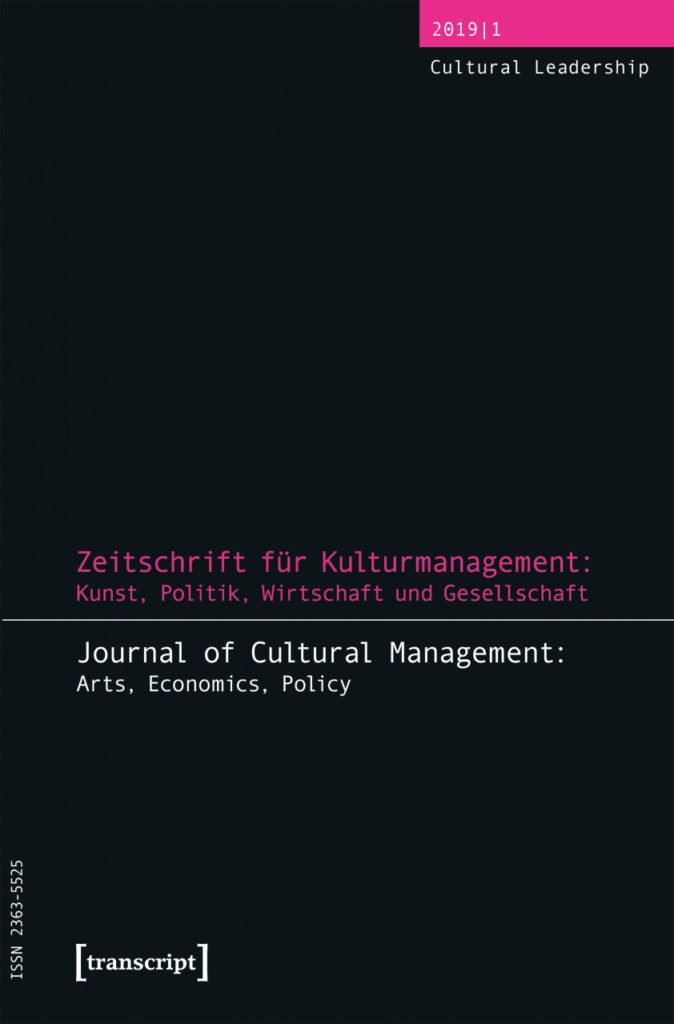Research Article
Imposed leadership in UK funded theatre and the implications for risk and innovation
Zusammenfassung
Using the theory of stakeholder salience and stakeholder discourse, this article questions the effect of arts policy bodies on the way the cultural sector assigns leadership. It argues that in satisfying the demands of risk-averse public management, arts policy bodies implicitly and explicitly impose the role of sectoral leader on the heads of largest best-funded cultural organisations. As a result, opportunities for alternate forms of leadership to emerge outside organisations are restricted. It renders organisational leaders in conflicting obligations to multiple stakeholders – their funders, their organisations and their sector – and exposes implicit perceptions of value. Finally, in reinforcing existing organisational structures, imposed leadership inhibits the risk- taking and innovation these same arts policy bodies promote in their strategies. This prevents the emergence of more transgressive forms of leadership and innovative cultural production and affects the ability of artists to be perceived as leaders. Consequently, artists’ sectoral and policy influence is diminished and their precarity and inequality reinforced at a structural level. While focused on subsidised theatre in the UK, this research offers wider implications for how we understand policy influence on ethical leadership behaviours in the cultural sector.
Schlagworte
2019 (1)
Cultural Leadership

Related Articles
Zeitschrift für Kulturmanagement und Kulturpolitik
Research Article
Struktur und Produktion eines Opernhauses und deren wechselseitige Beziehung
Zeitschrift für Kulturmanagement 2019 (1)
Essay
Dispositive der Kulturfinanzierung
Zeitschrift für Kulturmanagement 2015 (1)
Research Article
Evaluation im kulturpolitischen Wirkungsbereich
Grundprobleme und HerausforderungenZeitschrift für Kulturmanagement 2017 (1)
Research Article
Jahrbuch für Kulturmanagement 2009
Essay
Zeitschrift für Kulturmanagement 2015 (1)
Book Review
© 2025, Zeitschrift für Kulturmanagement und Kulturpolitik
Schlagworte
- Ästhetik
- Ausbildung
- Außenkulturpolitik
- Beruf
- Beruf und Rolle
- Besucherentwicklung
- Besucherforschung und Rezipientenforschung
- Besuchermotivation
- Betrieb
- Corona Pandemie
- Demokratie
- Digitalisierung
- Diversität
- Dritter Sektor
- Dritter Sektor
- Empirische Ästhetik
- Entwicklungsprozesse
- Ethik
- Evaluation
- Feldtheorie
- Festival
- Film
- Föderalismus
- Gemeinschaftliche Kunst
- Gesellschaftlicher Wandel
- Ideologie
- Inszenieren
- Karriere
- Kommunikation
- Konzert
- Kreativindustrie
- Kreativität
- Krise
- Kultur
- Kulturbetrieb
- Kulturelle Partizipation
- Kultureller Wandel
- Kulturfinanzierung
- Kulturfördergesetze
- Kulturgeschichte
- Kulturmanagement
- Kulturökonomie
- Kulturorganisation
- Kulturpädagogik
- Kulturpolitik
- Kulturproduktion
- Kultursoziologie
- Kulturvermittlung
- Kulturverständnis
- Kulturverwaltung
- Kulturwirtschaft
- Kulturwissenschaft
- Kunst
- Kunstfeld
- Kunstforschung
- Künstler
- Künstlerische Forschung
- Künstlerische Reputation
- Kunstmanagement
- Kunstorganisation
- Kunstpädagogik
- Kunstvermarktung
- Kunstverwaltung
- Kuratieren
- Leadership
- Literatur
- Lobby
- Management
- Marketing
- Markt
- Medien
- Methodenentwicklung
- Mexiko
- Monumentalisieren
- Museum
- Musik
- Nicht-Besucher-Forschung
- Oper
- Orchester
- Organisation
- Politischer Ausdruck
- Postfaktische Politik
- Professionelle Rolle
- Publikum
- Publikumsentwicklung
- Recht
- Regierung
- Rolle
- Sozial Engagierte Kunst
- Soziale Kohäsion
- Sozialer Wandel
- Sozialer Zusammenhalt
- Soziodemografie Nicht-Besucher
- Soziokultur
- Staat
- Symbolisches Kapital
- Tanz
- Teilhabegerechtigkeit
- Theater
- Theaterführung
- Theorieentwicklung
- Tourismus
- Transformation
- Umfrage
- Unternehmertum
- Urbaner Raum
- Zivilgesellschaft


